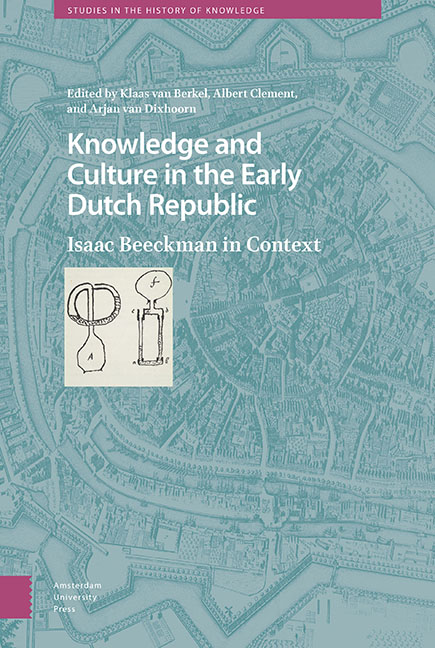10 - Beeckman’s Corpuscular Study of Plants
Published online by Cambridge University Press: 07 October 2022
Summary
Abstract
In his Journal, Isaac Beeckman investigated plants by means of his corpuscular and atomistic natural philosophy. These few notes specify Beeckman's interest in the vegetal realm, which was not natural historical nor connected to botanical catalogues, but which concerned the inner structures and processes of vegetal bodies. This chapter explores Beeckman's physicomathematical approach to plants: his interest in the Touch-me-not plant, his work on medicinal simples, and his investigation of plant formation. Additionally, these notes posit a connection between Beeckman and Bacon, as he comments on a couple of the latter's experiments on vegetal bodies, and Descartes, who discussed similar vegetal features. Beeckman's corpuscular framework sparked the early modern approach to botany as a science.
Keywords: Beeckman, touch-me-not herb, Dutch Baconianism, René Descartes, early modern botany
Isaac Beeckman played a significant role in the history of science, since he devised a physico-mathematical philosophy to investigate nature that influenced, if not inspired, René Descartes amongst others. Yet, Beeckman's role in the history of science should not be restricted to his precarious relationship with Descartes. On the contrary, he held a pivotal position that lays bare an important attempt to account for natural phenomena and bodies within a systematic theory of mathematical physics. His Journal (written between 1604 and 1637, and published in its entirety only in 1939-1953) is a useful source for unearthing the attempt to apply a systematic theory of mathematical physics to the study of nature. In other words, his natural philosophy combines mechanical ingenuity and mathematical methodology with a theoretical view. By means of his method, he fostered, if not anticipated, the modern approach to nature. In this sense, Beeckman was a son of his country. The Dutch Provinces of the time were a laboratory of practices and ideas and a crossroads between cultures, systems, and knowledge, as Delphine Antoine-Mahut and Catherine Secretan have recently shown.
Moving from these premises, in this chapter I explore Beeckman's focus on plants, one of the less-studied subjects of his broad range of interests. Although Beeckman may not be defined as a botanist nor as a botanical virtuoso in a strict sense, his attempt to deal with vegetation within his corpuscular, atomistic, and mechanical theory importantly surfaces in a few notes in his Journal and significantly anticipates a modern understanding of the vegetal realm of nature.
- Type
- Chapter
- Information
- Knowledge and Culture in the Early Dutch RepublicIsaac Beeckman in Context, pp. 239 - 258Publisher: Amsterdam University PressPrint publication year: 2022

